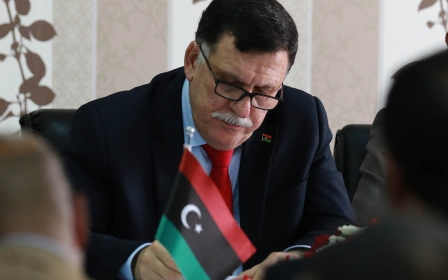Tripoli authorities cede power to Libya's unity government

Authorities in Libya's capital said on Tuesday they had ceded power to the UN-backed unity government, which marks as a major boost for a new government struggling to assert control in the conflict-ridden country.
The Tripoli-based administration - which had been ruling unilaterally from the capital - said that it had stepped aside, citing national interests.
"We inform you that we are ceasing the activities entrusted to us as an executive power," said a statement received by AFP and also published on the justice ministry website.
The statement, bearing the logo of the so-called National Salvation Government headed by Khalifa Ghweil, said the unrecognised Tripoli prime minister, his deputy premiers and cabinet ministers had all stepped aside.
It said the Tripoli authorities took the decision to quit because they were determined to "preserve the higher interests of the country and prevent bloodshed and divisions" in the North African country.
The Tripoli authorities were "no longer responsible... for what could happen in the future", it added.
The move came nearly a week after UN-backed prime minister-designate Fayez al-Sarraj arrived with members of his cabinet in the capital by sea, after the Tripoli authorities closed airspace to keep him out.
The international community has pleaded with Libya's warring sides to unite behind the unity government, which it sees as vital to tackling a militant expansion and rampant people smuggling in the North African state.
Since 2014, the rival government has sought to rule from Tripoli without international recognition and demanded until now that Sarraj leave the country or surrender.
The unity government, or Government of National Accord (GNA), was formed under a power-sharing deal agreed by Libyan lawmakers in December.
UN Libya envoy Martin Kobler hailed the announcement as "good news" but added that "deeds must follow words".
On Tuesday, Kobler flew into Tripoli for his first visit since Sarraj's arrival, in another sign of the unity government asserting its authority over the capital.
The UN envoy had himself been prevented from travelling to the capital last month by authorities in charge of the city.
Kobler praised the "courage and determination" of the unity government, which has since been operating out of a Tripoli naval base.
"We want to show that the UN and the international community support Prime Minister Sarraj and members of the presidency council," Kobler told AFP.
He said the UN was ready to provide "all the support needed" towards an "immediate and peaceful handover of power", speaking before the announcement by the unrecognised authorities.
Sarraj, a businessman from Tripoli, and his unity government have not yet received the endorsement of the rival government backed by the parliament in the east.
The new government's arrival has raised hopes it will be able to restore some stability in Libya, which has been plagued by chaos since Muammar Gaddafi's 2011 overthrow.
The new administration has been broadening its support, winning the backing of the Libyan Investment Authority, the National Oil Corporation and the Central Bank.
Ten coastal cities that were under the control of the Tripoli authorities have also backed the new government.
The GNA on Sunday received the backing of Libya's central bank, which said in a statement that it wished the new unity government “all the success in carrying out the difficult tasks ahead”.
Western governments are deeply concerned that Libya's disarray has allowed the Islamic State (IS) group to gain an important foothold in the country, but have said a foreign intervention can only take place at the request of a unity government.
Most foreign representatives have long since left the capital but Tunisia on Monday said it was reopening diplomatic missions in Tripoli following the new government's arrival.
French Foreign Minister Jean-Marc Ayrault praised Tunisia's decision on Tuesday and expressed hope for an eventual return of other embassies.
"The question of the return of our embassies is obviously a relevant one," he told reporters in Paris after talks with German counterpart Frank-Walter Steinmeier.
"We hope that this situation consolidates itself. If the Libyan government asks us to help it ensure its security, we are available."
Stay informed with MEE's newsletters
Sign up to get the latest alerts, insights and analysis, starting with Turkey Unpacked
Middle East Eye delivers independent and unrivalled coverage and analysis of the Middle East, North Africa and beyond. To learn more about republishing this content and the associated fees, please fill out this form. More about MEE can be found here.




